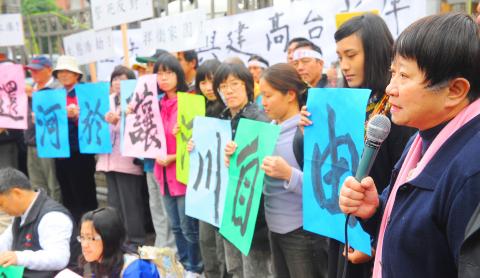Representatives from nearly 20 civic groups marked the International Day of Action for Rivers yesterday by urging the government to undertake a re-evaluation of the nation’s water resource policies — especially an improvement of the high water leakage rate as an alternative to building more reservoirs and dams.
“Liberate the rivers, return the rivers to the people,” “Love the rivers, no to reservoirs,” the groups shouted in front of the Legislative Yuan in Taipei, calling on the government to protect rivers in their natural form and stop building structures that destroy the environment.
The groups suggested policies governing water resource focused on changing the nation’s industrial structure, especially those sectors that have high water consumption, after a thorough evaluation of Taiwan’s natural resources and conditions.

Photo: Wang Min-Wei, Taipei Times
The groups also expressed their opposition to the planned construction of reservoirs, dams and other water diversion projects in their hometowns.
A number of lawmakers showed their support.
Chinese Nationalist Party (KMT) Legislator Chiu Wen-yen (邱文彥) said the government should consider diversified methods of water retention, and respect the living rights and cultures of riverine residents.
“The rain falls equally on everyone’s head,” said Fred Chiu (丘延亮), an associate research fellow at the Institute of Ethnology at the Academia Sinica.
Water resources are a public good, he added, and no one should be deprived of their rights to water for the benefit of a few industries.
Kuo Jen-hao (郭人豪) of the Changhua Environmental Protection Union said the proposed Dadu Weir (大度攔河堰) would collect about 800,000 tonnes of water from the upstream catchment area to accommodate the fourth-phase expansion of the Central Taiwan Science Park. That figure is more than double the 360,000 tonnes of tap water consumed in the county, he added.
Kao Wen-lu (高文祿) of the Pingsi Anti-Reservoir Union said areas near Keelung are known for abundant rainfall, so the government should consider how to collect rainwater instead of building a new reservoir.
Citing a report conducted by the Consumers’ Foundation in 2007, the group said the average water leakage rate in the area is 34.76 percent, and as high as 47 to 49 percent in Ruifang (瑞芳), adding that based on an average 260,000m3 daily water leakage in 2006, annual leakage would be about double the planned reservoir’s water storage capacity.
Representatives of Jian-Shih Anti-Dam Association, from Hsinchu County’s Jianshi Township (尖石), mostly Aborigines from Atayal villages, added that they are determined to fight against the construction of the Bilin (比麟) and Gaotai (高台) reservoirs in their homeland.
Atayal people regard the land as their mother and they live in peace with the land and nature, the group said, and they blamed the devastation of villages by typhoons on major constructions in the upstream catchment area.
Meanwhile, representatives of Citizen of the Earth, Taiwan, said hydroelectric power generated from dams is actually not a sustainable energy source, because the dams dry up the downstream area and greatly damage the ecosystem.

TRAFFIC SAFETY RULES: A positive result in a drug test would result in a two-year license suspension for the driver and vehicle, and a fine of up to NT$180,000 The Ministry of Transportation and Communications is to authorize police to conduct roadside saliva tests by the end of the year to deter people from driving while under the influence of narcotics, it said yesterday. The ministry last month unveiled a draft of amended regulations governing traffic safety rules and penalties, which included provisions empowering police to conduct mandatory saliva tests on drivers. While currently rules authorize police to use oral fluid testing kits for signs of drug use, they do not establish penalties for noncompliance or operating procedures for officers to follow, the ministry said. The proposed changes to the regulations require

Taipei, New Taipei City, Keelung and Taoyuan would issue a decision at 8pm on whether to cancel work and school tomorrow due to forecasted heavy rain, Keelung Mayor Hsieh Kuo-liang (謝國樑) said today. Hsieh told reporters that absent some pressing reason, the four northern cities would announce the decision jointly at 8pm. Keelung is expected to receive between 300mm and 490mm of rain in the period from 2pm today through 2pm tomorrow, Central Weather Administration data showed. Keelung City Government regulations stipulate that school and work can be canceled if rain totals in mountainous or low-elevation areas are forecast to exceed 350mm in

EVA Airways president Sun Chia-ming (孫嘉明) and other senior executives yesterday bowed in apology over the death of a flight attendant, saying the company has begun improving its health-reporting, review and work coordination mechanisms. “We promise to handle this matter with the utmost responsibility to ensure safer and healthier working conditions for all EVA Air employees,” Sun said. The flight attendant, a woman surnamed Sun (孫), died on Friday last week of undisclosed causes shortly after returning from a work assignment in Milan, Italy, the airline said. Chinese-language media reported that the woman fell ill working on a Taipei-to-Milan flight on Sept. 22

1.4nm WAFERS: While TSMC is gearing up to expand its overseas production, it would also continue to invest in Taiwan, company chairman and CEO C.C. Wei said Taiwan Semiconductor Manufacturing Co (TSMC) has applied for permission to construct a new plant in the Central Taiwan Science Park (中部科學園區), which it would use for the production of new high-speed wafers, the National Science and Technology Council said yesterday. The council, which supervises three major science parks in Taiwan, confirmed that the Central Taiwan Science Park Bureau had received an application on Friday from TSMC, the world’s largest contract chipmaker, to commence work on the new A14 fab. A14 technology, a 1.4 nanometer (nm) process, is designed to drive artificial intelligence transformation by enabling faster computing and greater power